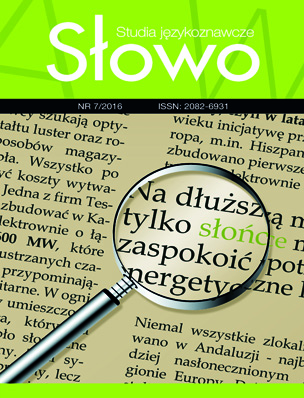Narracja skandalu obyczajowego. Sprawa Durczoka czy afera „Wprost”?
DOI:
https://doi.org/10.15584/slowo.2016.7.4Abstrakt
The aim of the article is description of media scandal narratives on the example of scandal with editor of “Fakty” Kamil Durczok, who was accused by “Wprost” of mobbing and harassment of journalists. The research material includes articles published in the “Wprost” and “Newsweek” magazines, newspapers: “Fakt” and “Super Express” and posted on the websites: wpolityce.pl and se.pl. The article indicates differences in meaning between lexemes that are used to present a specific vision of events, such as: sprawa, afera, skandal and derivative nouns with suffix -gate. The article presents narrative structures that are characteristic for the scandal. Those structures include character creation, his activities and intentions, and obstacles encountered during the attempt of achieving his goal. Analysis of the material made it possible to distinguish two opposing rhetorical strategies: aggressive and defensive. Those strategies can be used to successively attack and defend of those involved in the scandal. The article also presents how these strategies can be used to create opposing visions of reality.Downloads
Bibliografia
Achter P., 2000, Narrative, intertextuality, and apologia in contemporary political scandals, “Southern Communication Journal”, t. 65, cz. 4, s. 318–333, [dostęp: 28.03.2015] <https://www.academia.edu/1368844/Narrative_intertextuality_and_apologia_in_contemporary_political_scandals>.
Bauer Z., 2008, Gatunki dziennikarskie [w:] Dziennikarstwo i świat mediów. Nowa edycja, red. Z. Bauer, E. Chudziński, Kraków, s. 255–280.
Cegieła A., 2014, Słowa i ludzie, Warszawa.
Dijk T. van, 1985, Działanie, opis działania a narracja, „Pamiętnik Literacki”, t. 76, nr 1, s. 145–166.
Fisher W., 1998, Narration as Human Communication Paradigm: the Case of Public Moral Argument [w:] Contemporary Rhetorical Theory: A Reader, red. J. Lucaites, C.M. Condit, S. Caudill, New York, s. 265–287.
Kochan M., 1994, Przyklejanie etykietek, czyli o negatywnym nazywaniu przeciwnika, „Język a Kultura”, t. 11: Język polityki a współczesna kultura polityczna, red. J. Anusiewicz, B. Siciński, Wrocław, s. 85–90.
Kudra B., 2011, O tzw. derywacji pragmatycznej i derywatach pragmatycznych (słowotwórstwo a pragmatyka), „Wokół Słów i Znaczeń”, t. 4: Słowotwórstwo a media, red. E. Badyda, J. Maćkiewicz, E. Rogowska-Cybulska, Gdańsk, s. 13–18.
Łaziński M., 2015, Słowo stycznia, [dostęp: 28. 03. 2015] <http://www.slowanaczasie.uw.edu.pl/?p=2863>.
Michałowski P., 2003, Strategie skandalu i stereotypy odbioru, „Przestrzenie Teorii”, nr 2, Poznań, s. 73–88.
Miłkowska-Samul K., 2013, Emocje a skandal polityczny. O sposobach wykorzystania emocji w dyskursie politycznym, „Przegląd Socjologii Jakościowej”, t. 9, nr 2, s. 164‒183 [dostęp: 28.03.2015] .
Piekot T., 2007, Obraz świata w polskich wiadomościach dziennikarskich – propozycja metody rekonstrukcji [w:] Kreowanie światów w języku mediów, red. P. Nowak, R. Tokarski, Lublin, s. 69‒85.
Sękowska E., 2012, Neologizmy słowotwórcze we współczesnej polszczyźnie (wybrane tendencje), „Eslavística Complutense”, z. 12, s. 97–103.
Sobczak B., 2013, Jesteśmy tym, co opowiadamy. Autonarracje w mediach [w:] Narracyjność języka i kultury. Literatura i media, red. D. Filar, D. Piekarczyk, Lublin, s. 101–116.
Thopmson J., 2010, Skandal polityczny. Władza i jawność w epoce medialnej, tłum. M. Habura, Warszawa.
Trzebiński J., 2001, Narracyjne konstruowanie rzeczywistości [w:] Narracja jako sposób rozumienia świata, red. J. Trzebiński, Sopot, s. 17–42.
Wasilewski J., 2012, Opowieści o polityce. Retoryka narracji, Warszawa.
Waszakowa K., 2005, Przejawy internacjonalizacji w słowotwórstwie współczesnej polszczyzny, Warszawa.
Wojdyła M., 2011, Wybrane wyznaczniki stylu tabloidów (na podstawie pierwszych stron gazet) [w:] Oblicza kultury, t. 4: Tabloidy, język, wartości, obraz świata, red. I. Kamińska-Szmaj, T. Piekot, M. Poprawa, Wrocław, s. 139–150.
Wyrwas K., 2004, Rywingate i pracoholik – derywaty sufiksalne czy złożenia?, „Język Polski”, LXXXIV, s. 146–148.
Pobrania
Opublikowane
Jak cytować
Numer
Dział
Licencja
Prawa autorskie (c) 2016 Słowo. Studia językoznawcze

Utwór dostępny jest na licencji Creative Commons Uznanie autorstwa – Użycie niekomercyjne 4.0 Międzynarodowe.


